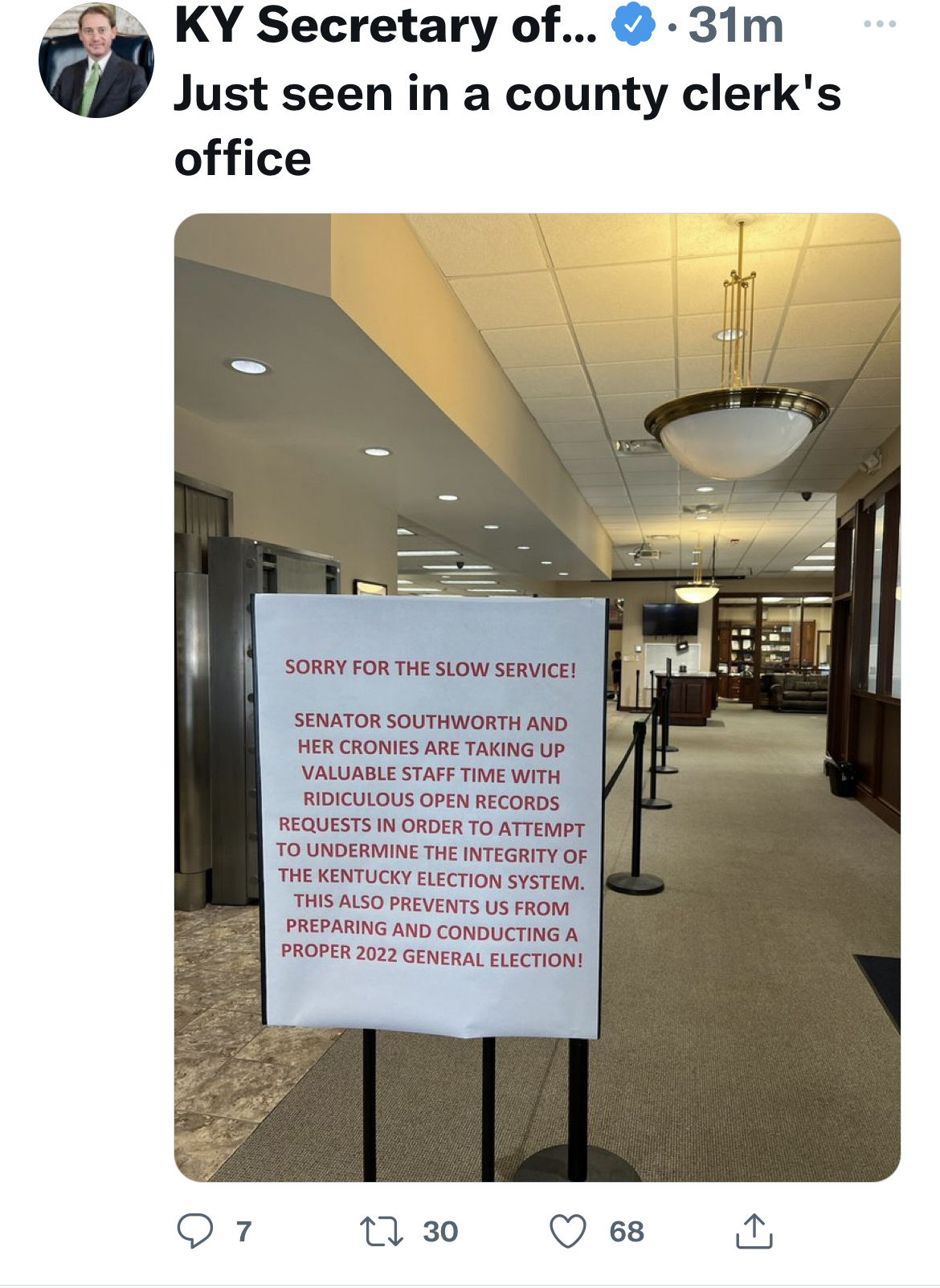
Secretary of State Michael Adams today tweeted a photo of a sign posted in a county clerk’s office — somewhere in Kentucky — that read:
“Sorry for the slow service.
“Senator Southworth and her cronies are taking up valuable staff time with ridiculous open records requests in order to attempt to undermine the integrity of the Kentucky election system. This also prevents us preparing and conducting a proper 2022 General Election.”
Although it does not appear to be the intent of the county clerk, or the SOS, to scapegoat the open records law, we are hopeful that the public will resist the temptation to blame the law for an apparent abuse by resident and nonresident requesters.
The virtue of Kentucky’s open records law is that it addresses such abuse by providing:
“If the [records] application places an unreasonable burden in producing public records or if the custodian has reason to believe that repeated requests are intended to disrupt other essential functions of the public agency, the official custodian may refuse to permit inspection of the public records or mail copies thereof. However, refusal under this section shall be sustained by clear and convincing evidence.”
https://apps.legislature.ky.gov/law/statutes/statute.aspx?id=51391
In construing this statute, past attorneys general have recognized that although “it is the legislative intent that public agency employees exercise patience and long-suffering in making public records available for public inspection,” public employees “are the servants of all the people and not only of persons who make extreme and unreasonable demands on their time.”
https://ag.ky.gov/Resources/orom/2001/01ORD131.doc
And while the courts have opined that “a public agency refusing to comply with an open records request on this unreasonable-burden basis faces a high proof threshold since the agency must show the existence of the unreasonable burden ‘by clear and convincing evidence,” the unreasonable burden/intent to disrupt essential functions statutory defense is available in substantiated cases of
abuse.
Commonwealth v Chestnut https://caselaw.findlaw.com/ky-supreme-court/1387319.html
Having recently contacted a county clerk on an unrelated matter, I was aware of this multipart request submitted to all 120 county clerks by a resident (not Southworth herself) believed to be acting on behalf of no less than the nonresident My Pillow guy. The clerk was indignant about the enormous efforts that would be required to fulfill it and the impact on office services.
In the course of our conversation, I asked the clerk whether he had considered the unreasonable burden/intent to disrupt statute as a basis for denying the request.
He expressed understandable reluctance to raise this defense. In Chestnut, the Kentucky Supreme Court held, “The obvious fact that complying with an open records request will consume both time and manpower is, standing alone, not sufficiently clear and convincing evidence of an unreasonable burden.”
But past attorneys general have affirmed denials based on unreasonable burden/intent to disrupt essential functions in those rare cases where “the applicant’s use of the law becomes an abuse of the law within the contemplation of KRS 61.872(6).”
We also discussed the unavailability of the residency requirement — purportedly enacted by the General Assembly in 2021 to provide relief to local agencies overwhelmed by nonresident requesters — as a defense in this case.
The county clerk with whom I spoke indicated that the open records residency statute —which the Kentucky Open Government Coalition vigorously but unsuccessfully opposed in 2021 — has afforded local agencies no relief whatsoever.
In a veto request directed to the Governor Beshear in March 2021, we wrote:
“Embedded in Kentucky's Open Records Act is the solution to the problem HB 312 purports to resolve. The Act contains an ‘unreasonable burden/intent to disrupt essential functions’ provision that is an effective cure to the problem of nonresident abusers of our records access laws if legitimately invoked by public agencies. Commercial users copying fees also embedded in the Act permit agencies to recover fees commensurate with the value of the records.
“We believe that Kentucky will learn only after it is too late that the residency requirement which is a central feature of HB 312 will benefit neither our public agencies nor our residents and that the importance of our public records extends beyond the state line.”
https://kyopengov.org/blog/today-letter-signed-members-kentucky-open-go…
Beshear vetoed the bill and the legislature — in an all too familiar exhibition of it arrogance/ ignorance — overrode the veto. The new law took effect.
And, as predicted, the joke is on public agencies and open records requesters near and far.


